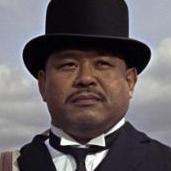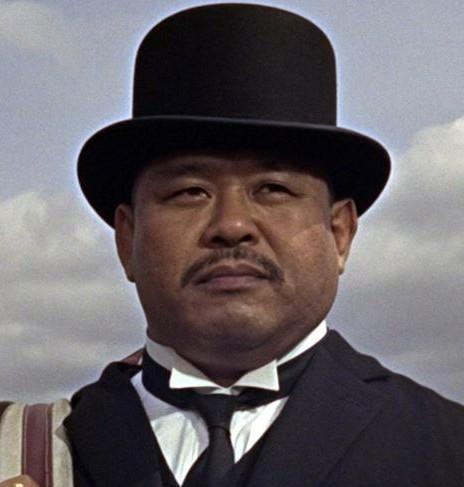-
Posts
12,924 -
Joined
-
Last visited
Content Type
Profiles
Forums
Events
Blogs
Everything posted by Teasing the Korean
-

Anatomy of a Murder - Duke Ellington
Teasing the Korean replied to Teasing the Korean's topic in Discography
And? -
Why does this album sound so much worse than Duke's other Columbia albums of the period, and why does the expanded CD sound worse than the LP? It is so tinny and shrill, and the bass all but disappears in many passages. I wonder if the original LP-length CD sounds better than this. I realize that this music was recorded unnervingly close to the film's premiere. Did that have something to do with it?
-
I heard a certain amount of classical music growing up, but not a huge amount. I must credit Thee Great Carl Stalling for being probably my first major introduction to classical music. I hope that I never in my life hear the entire Barber of Seville, because I know that it can never be as great as the Warner Brothers cartoon under any possible circumstances. I was self-taught on piano as a kid, but when I began studying formally as a teen, I had an affinity for both baroque and modern music (Debussy, Ravel and later), but the romantic and classical eras did little for me, save Chopin, whose music I adore. The two big things that got me into classical music as an adult, though, were (1) my love of film scores, particularly the era of eclectic, adventurous film scoring that occurred roughly between the late 1950s and mid-1970s; and (2) my love of jazz arranging and orchestration. There are advantages to having a haphazard musical education: You end up with all sorts of weird fourth-dimension references, relationships, and juxtapositions in your mind. On the other hand, the references are often upside-down. Listening to Sinatra's Where are You and No One Cares as a kid, I had no idea that Gordon Jenkins was channeling Mahler and Tchaikovsky. Now, whenever I hear the final movement of Tchaikovsky's Pathetique, I keep waiting for Frank to come in, but he never arrives.
-

I am interviewing Oliver Nelson, Jr.
Teasing the Korean replied to LarryCurleyMoe's topic in Jazz Radio & Podcasts
Was the interview ever posted, and if so, is it archived? -

Monk Blue Note Genius of Modern Music, CDs vs LPs
Teasing the Korean replied to Teasing the Korean's topic in Discography
Oh, I have the Prestige stuff too, but I LOVE the Columbia albums, despite what the detractors say. -

Monk Blue Note Genius of Modern Music, CDs vs LPs
Teasing the Korean replied to Teasing the Korean's topic in Discography
Thanks, as I thought. I'll stick with these RVGs and then pick up that Milt Jackson for the missing tracks. Along with the Riverside Monk box set and all the Columbia albums, that's probably enough Monk for one lifetime! -

Monk Blue Note Genius of Modern Music, CDs vs LPs
Teasing the Korean replied to Teasing the Korean's topic in Discography
How does the mastering on this set compare to that on the later "Genius of Modern Music" CDs with RVG mastering and 10" cover art? The latter are the best I've ever heard this material sound. -
Can anyone comment on this score, either within the context of the film or on the album? I realize there was a "songtrack" CD; I am referring to the score album with Blanchard's music.
-

Little Jimmy Scott omitted from mention at the Grammys.
Teasing the Korean replied to Hardbopjazz's topic in Artists
Well, we can always hold out hope that he will be inducted into the Rock and Roll Hall of Fame. -
One of the weirdest things he did was taking some Mastersounds tracks and adding exotic percussion to them to create an exotica LP! The finished album was credited to the two percussionists, Milt Holland and Roy Harte. Everyone on the LP receives credit, though, and the liner notes suggest that it was a single session conceived with everyone's participation. The results are actually pretty good, regardless of how one may feel about it philosophically. Still, an odd record.
-
This would be a great book. Surprised that no one ever wrote one.
-
If I follow the syntax of your sentence, I don't agree that Rugolo was "an extremely high level formulaic device-dependent hack but who when working elsewhere had some good ideas." And I guess you realize that Cuban Fire was Johnny Richards, not Rugolo. If you trim the pompous intros and codas from those arrangements, you do get a nice selection of 6 or 7 tunes, but the whole thing runs about 20 minutes without the pompous parts.
-
I read Gioia's book ages ago, and for the most part, I liked it. One area where I found it lacking was that he barely touched on the proximity of Hollywood and film industry. He did not discuss how Hollywood film scores may have influenced various west coast composers, arrangers, and musicians, nor did he go into much detail about their contributions to film and TV scoring after Peter Gunn opened the doors. I do remember him dismissively describing a favorite Rugolo arrangement as - and I'm paraphrasing - "the soundtrack to a film that the listener cannot see," or some such nonsense. I also don't like Gioia's mustache, but that's another topic.
-
Not to speak for Larry, but I think he made his point very clear several pages back, in delineating what has stylistically become known as "West Coast Jazz" vs. any jazz recorded on the west coast and/or by musicians residing on the west coast. Not sure how all the confusion arose.
-
I don't get the "overly arranged" criticism of WCJ. If arranged music Isn't "jazz" enough, then I'm happy to appreciate it as music on its own terms and not worry about what it is called. I don't care how "jazz" is supposed to be approached if I like the final results.
-
My quoin My quintessential west coast jazz albums include: The Short Stops Collection (CD version) Shelly Manne plays Peter Gunn vol. 1 and 2 I Want to Live - Gerry Mulligan and Johnny Mandel LPs (collected together on CD) Annie Ross with Gerry Mulligan
-
I never pass up a Jim Flora cover. Some are better than others, but it's hard for me to rank them. To Larry's point: I did buy the album for the cover, and spun it once, and didn't care for it. I am not a fan of Andre Previn's "jazz," at least what I've heard. And with Shorty Rogers, I feel like I started with the best and could never find anything as good afterward. I became aware of him through a CD called "Short Stops," which collected two of his early 10" albums and the Wild One EP. I then started picking up all of the LPs I could find, but none of them ever struck me like the music on that CD. Is it because those are his best arrangements, or is it because I heard them first?
-
I bought the LP specifically for the Jim Flora cover! I should give the LP a spin sometime!
-
I was getting ready to chime in until I read this last sentence. It was the 1970s, and this is what Blue Note sounded like.
-
University of South Florida? That is where my friends took his class. Don't know if he taught elsewhere at other points in his career.
-
New, complete recording of Obsession coming this Spring! https://www.facebook.com/video.php?v=731987126897180
-
Gene came up in my recent Mike Nesmith thread, and Gene most certainly deserves his own thread. Here is one of my favorite early Gene Clark tunes:
-
I'd mentioned before in another thread. Knocky was an English professor and some friends of mine had taken his class. He insisted on having a piano in the room where he taught, and when the class discussion was getting nowhere and he was frustrated, he would sit down and play a Scott Joplin rag.
_forumlogo.png.a607ef20a6e0c299ab2aa6443aa1f32e.png)
